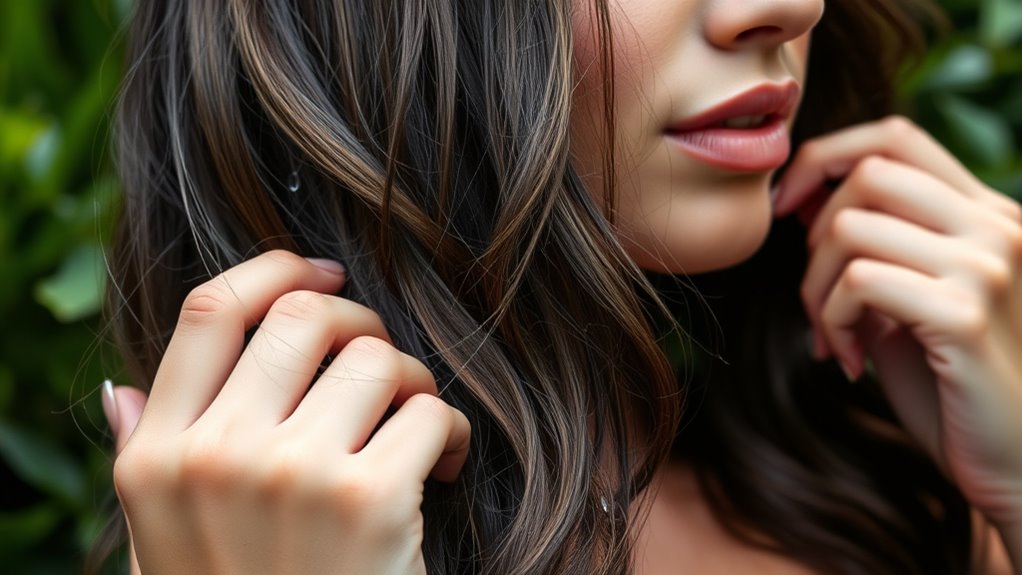To combat humidity and prevent frizz, choose shampoos and conditioners formulated for humidity resistance, avoiding sulfates that strip natural oils. Apply leave-in and anti-humidity serums on damp hair to create a moisture barrier. Opt for air drying or cool blow-drying to seal the cuticle, and use silk pillowcases or scarves overnight for extra protection. Incorporating science-backed products and techniques can help keep your hair smooth; discover more tips that work in real-world conditions.
Key Takeaways
- Use humidity-resistant shampoos and conditioners infused with silicones or natural oils to create a protective moisture barrier.
- Apply leave-in conditioners or anti-humidity serums on damp hair for optimal moisture sealing and frizz control.
- Prefer air drying or cool blow-drying techniques to help seal the cuticle and prevent moisture intrusion.
- Sleep on silk or satin pillowcases and cover hair with silk scarves to reduce friction and moisture loss overnight.
- Incorporate specialized humidity-resistant hair products to enhance environmental protection and maintain a sleek, frizz-free look.

When humidity rises, your hair can quickly turn frizzy and unmanageable, making it frustrating to maintain your style. That’s because moisture in the air interacts with the cuticle of your hair, causing it to swell and lift, which leads to frizz. To combat this, you need effective strategies focused on frizz control and moisture retention. These aren’t just tips; they’re backed by science to help you keep sleek, smooth hair even when the weather isn’t cooperating.
First, consider your shampoo and conditioner choices. Opt for products designed specifically for humidity resistance. Look for those infused with silicones or natural oils, which create a barrier on your hair’s surface, helping to seal in moisture and prevent excess humidity from penetrating. This barrier is essential for frizz control because it reduces the swelling of hair strands. Proper moisture retention also means your hair stays hydrated and more resilient to environmental stressors. Avoid sulfate-based shampoos, as they strip away natural oils, leaving your hair dry and more prone to frizz when humidity spikes.
Choose humidity-resistant shampoos with silicones or natural oils to seal in moisture and fight frizz.
Another key hack involves applying a leave-in conditioner or anti-humidity serum while your hair is still damp. These products contain ingredients that act as moisture barriers, locking in hydration and creating a protective shield. When you distribute these evenly, they help your hair resist the humidity’s effects, maintaining smoothness and reducing frizz. Be mindful not to overload your hair with product, as excess can weigh it down or make it look greasy. Instead, focus on a light, even application, particularly on the ends and mid-lengths.
Using the right styling tools also makes a difference. Air drying is preferable, but if you must blow-dry, use a nozzle attachment and set it to a cool or low heat setting. Finish with a blast of cool air to help seal the cuticle, which enhances moisture retention and minimizes frizz. Additionally, finishing with a small amount of anti-frizz serum or oil can help smooth out any flyaways and add extra moisture control. Remember, the goal is to keep the cuticle flat and sealed, preventing moisture from infiltrating and causing frizz.
Finally, do not underestimate the power of protecting your hair overnight. Sleeping on a silk or satin pillowcase reduces friction, helping your hair retain moisture and stay smooth. Covering your hair with a silk scarf can further shield it from humidity and prevent overnight frizz. These simple adjustments work on a scientific level to sustain moisture retention and control frizz, ensuring your hair remains manageable and polished despite humid conditions. Additionally, using specialized hair products formulated for humidity resistance can provide an extra layer of protection. With these humidity hair hacks, you’re better equipped to face the weather and keep your hair looking its best.
Frequently Asked Questions
Can Humidity Cause Damage to Hair Over Time?
Yes, humidity can cause damage to your hair over time. It leads to humidity damage by making your hair swell and weaken the cuticle, which results in hair deterioration. Constant exposure to high humidity levels can cause frizz, breakage, and dullness. To protect your hair, use anti-frizz products and deep conditioning treatments. Staying mindful of humidity’s effects helps maintain your hair’s health and prevents long-term damage.
Do All Hair Types React the Same to Humidity?
Think of your hair as a unique garden that reacts differently to weather; not all plants thrive the same. When exposed to humidity effects, your hair’s elasticity plays a key role in how it responds. Some hair types, like curly or coarse, absorb moisture and frizz more easily, while straight or fine hair may stay smoother. So, your hair type influences its reaction to humidity, making personalized tips essential.
Are There Natural Remedies to Protect Hair From Humidity?
Yes, you can use natural remedies to protect your hair from humidity. Applying herbal oils like argan or neem helps create a barrier, reducing frizz and moisture absorption. Coconut treatments are also effective; they penetrate hair strands, strengthening and sealing the cuticle against humidity. Regularly massaging these oils into your scalp and hair can keep your locks smooth, shiny, and less affected by weather conditions.
How Does Humidity Influence Hair Color Longevity?
Humidity effects your hair color by causing fading and dullness, reducing color retention over time. When humidity levels rise, moisture interacts with hair dye molecules, breaking down the color and making it less vibrant. To protect your color, you need to form a barrier, seal in the hue, and minimize moisture absorption. Keep your hair hydrated, use color-safe products, and wear hats to help maintain your color’s brilliance and longevity.
Can Diet Impact How Hair Responds to Humidity?
Your diet influence can definitely impact how your hair responds to humidity. Eating foods rich in biotin, omega-3s, and vitamins A, C, and E helps strengthen hair and improve moisture balance. When your hair is healthier and more resilient, it’s less prone to frizz and damage caused by humidity. So, maintaining a balanced diet supports better hair response, keeping your locks smoother and more manageable even in humid conditions.
Conclusion
Think of your hair like a sponge—when humidity hits, it soaks up water and swells, leading to frizz. But with these science-backed hacks, you’re like a master wringer, controlling that moisture. I once forgot my anti-humidity spray before a beach trip and ended up with a puffball instead of beach waves. Now, armed with these tips, you can keep your hair calm and sleek, no matter how damp the air gets.









